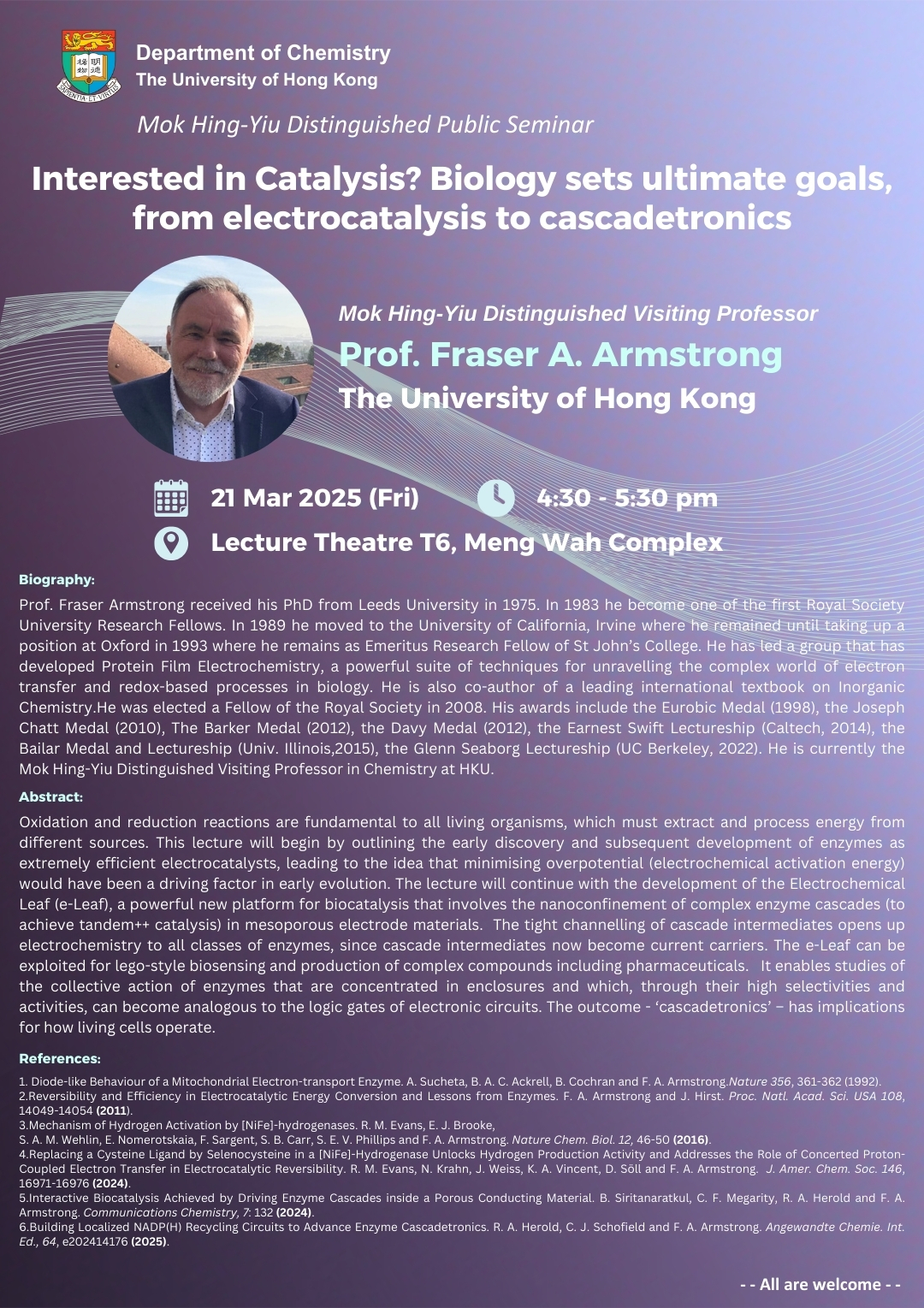| Date | 21 Mar 2025 |
| Time | 4:30 pm - 5:30 pm (HKT) |
| Venue | Lecture Theatre T6, Meng Wah Complex |
| Speaker | Prof. Fraser A. Armstrong |
| Institution | The University of Hong Kong |

Title:
Interested in Catalysis? Biology sets ultimate goals, from electrocatalysis to cascadetronics
Schedule:
Date: 21st March, 2025 (Friday)
Time: 4:30 - 5:30 pm (HKT)
Venue: Lecture Theatre T6, Meng Wah Complex
Speaker:
Mok Hing-Yiu Distinguished Visiting Professor
Prof. Fraser A. Armstrong
The University of Hong Kong
Biography:
Prof. Fraser Armstrong received his PhD from Leeds University in 1975. In 1983 he become one of the first Royal Society University Research Fellows. In 1989 he moved to the University of California, Irvine where he remained until taking up a position at Oxford in 1993 where he remains as Emeritus Research Fellow of St John’s College. He has led a group that has developed Protein Film Electrochemistry, a powerful suite of techniques for unravelling the complex world of electron transfer and redox-based processes in biology. He is also co-author of a leading international textbook on Inorganic Chemistry. He was elected a Fellow of the Royal Society in 2008. His awards include the Eurobic Medal (1998), the Joseph Chatt Medal (2010), The Barker Medal (2012), the Davy Medal (2012), the Earnest Swift Lectureship (Caltech, 2014), the Bailar Medal and Lectureship (Univ. Illinois,2015), the Glenn Seaborg Lectureship (UC Berkeley, 2022). He is currently the Mok Hing-Yiu Distinguished Visiting Professor in Chemistry at HKU.
Abstract:
Oxidation and reduction reactions are fundamental to all living organisms, which must extract and process energy from different sources. This lecture will begin by outlining the early discovery and subsequent development of enzymes as extremely efficient electrocatalysts, leading to the idea that minimising overpotential (electrochemical activation energy) would have been a driving factor in early evolution. The lecture will continue with the development of the Electrochemical Leaf (e-Leaf), a powerful new platform for biocatalysis that involves the nanoconfinement of complex enzyme cascades (to achieve tandem++ catalysis) in mesoporous electrode materials. The tight channelling of cascade intermediates opens up electrochemistry to all classes of enzymes, since cascade intermediates now become current carriers. The e-Leaf can be exploited for lego-style biosensing and production of complex compounds including pharmaceuticals. It enables studies of the collective action of enzymes that are concentrated in enclosures and which, through their high selectivities and activities, can become analogous to the logic gates of electronic circuits. The outcome - ‘cascadetronics’ – has implications for how living cells operate.
References:
1. Diode-like Behaviour of a Mitochondrial Electron-transport Enzyme. A. Sucheta, B. A. C. Ackrell, B. Cochran and F. A. Armstrong.Nature 356, 361-362 (1992).
2. Reversibility and Efficiency in Electrocatalytic Energy Conversion and Lessons from Enzymes. F. A. Armstrong and J. Hirst. Proc. Natl. Acad. Sci. USA 108, 14049-14054 (2011).
3. Mechanism of Hydrogen Activation by [NiFe]-hydrogenases. R. M. Evans, E. J. Brooke,
S. A. M. Wehlin, E. Nomerotskaia, F. Sargent, S. B. Carr, S. E. V. Phillips and F. A. Armstrong. Nature Chem. Biol. 12, 46-50 (2016).
4. Replacing a Cysteine Ligand by Selenocysteine in a [NiFe]-Hydrogenase Unlocks Hydrogen Production Activity and Addresses the Role of Concerted Proton-Coupled Electron Transfer in Electrocatalytic Reversibility. R. M. Evans, N. Krahn, J. Weiss, K. A. Vincent, D. Söll and F. A. Armstrong. J. Amer. Chem. Soc. 146, 16971-16976 (2024).
5. Interactive Biocatalysis Achieved by Driving Enzyme Cascades inside a Porous Conducting Material. B. Siritanaratkul, C. F. Megarity, R. A. Herold and F. A. Armstrong. Communications Chemistry, 7: 132 (2024).
6. Building Localized NADP(H) Recycling Circuits to Advance Enzyme Cascadetronics. R. A. Herold, C. J. Schofield and F. A. Armstrong. Angewandte Chemie. Int. Ed., 64, e202414176 (2025).
- - ALL ARE WELCOME - -
